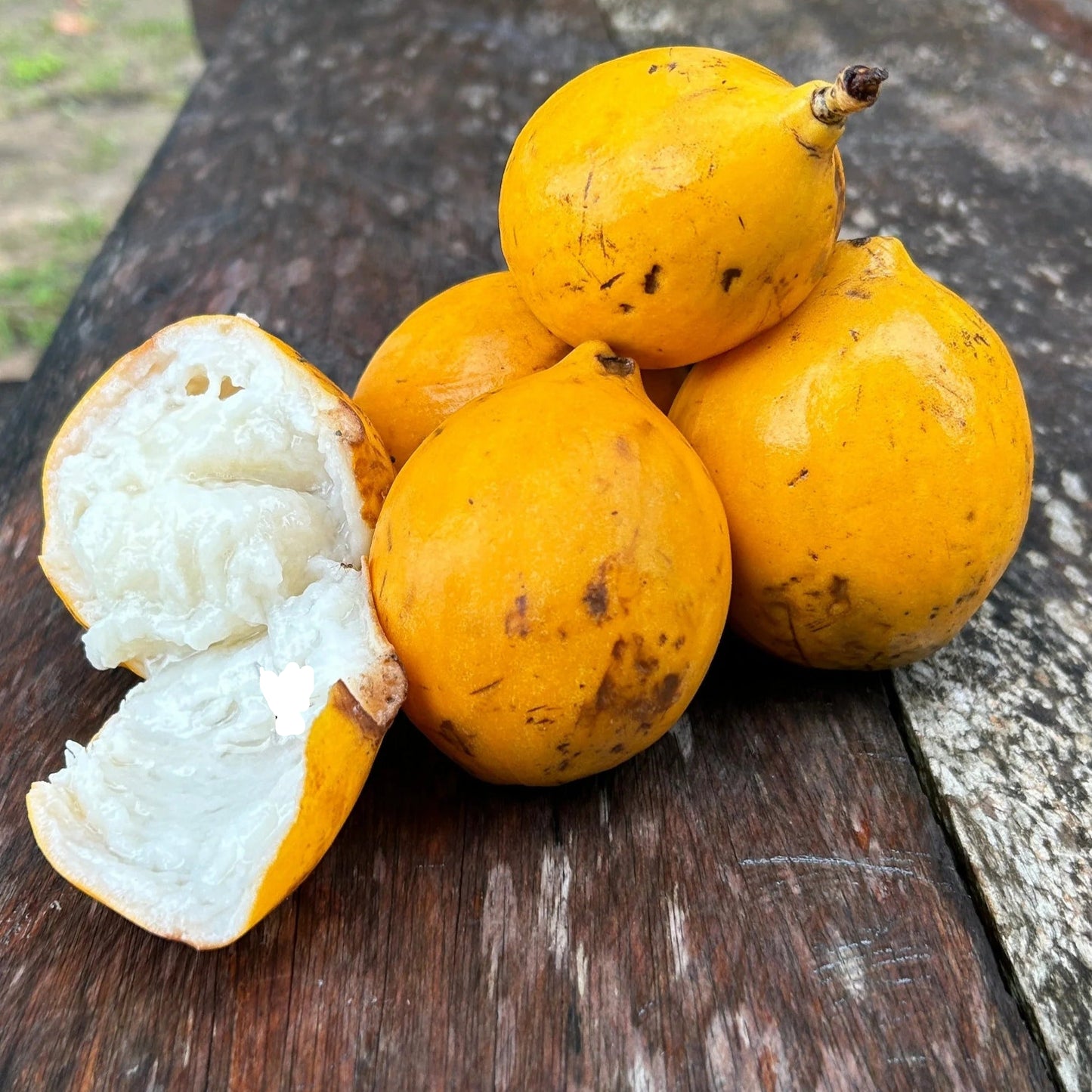Love it? Add to your wishlist
Your favorites, all in one place. Shop quickly and easily with the wishlist feature!
[message]
[title]
[message]


Veliyath Gardens
Couldn't load pickup availability
Description:
Discover the rare Clausa Fruit Plant (Plinia clausa), also called Anihuayo or Chicle guayo, a treasured species from the Amazon rainforest. Learn about its cultivation, nutritional richness, health benefits, and cultural significance—an exotic delight now available for your tropical fruit garden.
The Clausa Fruit Plant (Plinia clausa), known locally as Anihuayo, Aniguayo, or Chicle guayo, is a remarkable tropical species from the Amazon basin, particularly Peru. Belonging to the Myrtaceae family, this plant is celebrated for its bright golden-orange fruits that are as visually stunning as they are flavorful. Once primarily harvested from the wild, the Clausa is now increasingly cultivated in home orchards, exotic fruit gardens, and specialty nurseries, where it continues to fascinate fruit lovers and plant collectors alike.
Family: Myrtaceae
Botanical Name: Plinia clausa
Common Names: Anihuayo, Aniguayo, Chicle guayo
Native Range: Peru, with presence in wider Amazonian regions
The Clausa tree typically grows between 5–12 meters tall, with a trunk diameter of 15–30 cm. Its dense foliage forms a lush canopy, making it an attractive addition to both wild landscapes and cultivated fruit gardens. The plant produces clusters of bright yellow-orange fruits, whose sweet aroma and taste make them popular among both humans and wildlife.
The Clausa thrives in the humid lowlands of the Amazon rainforest, where abundant rainfall and fertile soils create ideal growing conditions.
Climate Suitability: Grows well in tropical and subtropical regions, including South America, Central America, and similar climatic belts in Asia and India.
Soil Preference: Fertile, well-drained soils enriched with organic matter.
Watering Needs: Requires consistent moisture; irrigation is recommended during dry spells.
Light Exposure: Prefers full sun but adapts to partial shade.
Fruiting Age: Bears fruit in 4–6 years, a relatively short waiting period compared to other rare Amazonian species.
Maintenance: Moderate; pruning and mulching improve productivity and fruit quality.
This adaptability has made it a trending choice in exotic plant nurseries, where demand continues to rise.
The Clausa fruit is truly a delight:
Appearance: Round to oval, bright yellow-orange skin when ripe.
Aroma: Pleasantly fragrant, signaling ripeness.
Flavor: Sweet with a mild tropical tang, appealing to a wide palate.
Texture: Soft, juicy pulp with a refreshing bite.
Its combination of vivid color, pleasing fragrance, and tropical sweetness makes it both a culinary star and a decorative highlight in fruit bowls.
Scientific analyses and traditional uses highlight the Clausa fruit as a nutrient-rich superfood:
Rich in Vitamin C: Strengthens immunity and aids collagen production.
Protein Content: Provides sustained energy while keeping the fruit light on carbohydrates.
Calcium & Phosphorus: Essential for bone strength, teeth health, and proper cell function.
Low Carbohydrate Profile: Suitable for individuals mindful of sugar intake, including diabetics when consumed in moderation.
Boosts Immunity – Protects against common colds and infections.
Supports Bone and Dental Health – With natural calcium and phosphorus.
Energy Without Excess Sugar – A wholesome fruit for active lifestyles.
Skin Nourishment – Vitamin C and antioxidants contribute to glowing, youthful skin.
The Clausa fruit is versatile in its culinary potential:
Fresh Consumption: Relished straight from the tree for its refreshing sweetness.
Preserves: Popular for making jams, jellies, and marmalades.
Fermented Drinks: In Peru, it is sometimes used to create local liquors and wines.
Desserts: Incorporated into puddings, smoothies, and fruit salads for a tropical twist.
Its natural sweetness and pleasant aroma make it a favorite ingredient in both traditional Amazonian kitchens and modern experimental recipes.
Amazonian communities have long treasured the Clausa for both food and medicine:
Traditional Remedy: Consumed as a restorative tonic during seasonal illnesses.
Digestive Support: Believed to ease mild stomach ailments due to its balanced fiber and nutrient content.
Community Trade: Historically bartered or sold in local markets, contributing to rural economies.
These traditions reflect the Clausa’s cultural and medicinal significance, linking it deeply with the heritage of Amazonian peoples.
Cultivating Clausa Fruit Plants also contributes to biodiversity and ecological health:
Provides habitat and food for birds, pollinators, and small mammals.
Encourages sustainable farming practices by reducing dependence on wild populations.
Plays a role in rainforest conservation when grown in managed gardens.
By planting the Clausa, growers directly participate in preserving a species tied closely to the Amazon’s natural balance.
Rare and Exotic: Not commonly found outside South America, making it a prized collector’s plant.
Nutrient-Dense Fruit: Offers a balance of flavor and health benefits.
Adaptable: Grows well in tropical gardens and exotic plant nurseries.
Cultural Heritage: A fruit steeped in Amazonian tradition.
At Veliyath Gardens, we bring this rare fruit plant to passionate gardeners, ensuring limited but high-quality stock for those eager to expand their orchards with meaningful and exotic varieties.
The Clausa Fruit Plant (Plinia clausa) is more than just another tropical fruit—it is a symbol of Amazonian biodiversity, a source of nutrition, and a cultural heritage plant. With its striking golden fruits, delicious taste, and multiple health benefits, it holds a special place among rare tropical species. By cultivating Clausa in your garden, you not only enjoy a unique culinary and health experience but also contribute to the conservation of a remarkable Amazonian plant.
Bring home the Clausa today—add a touch of the Amazon to your fruit garden with Veliyath Gardens.
Climate Suitability: Grows well in tropical and subtropical regions, including South America, Central America, and similar climatic belts in Asia and India.
Soil Preference: Fertile, well-drained soils enriched with organic matter.
Watering Needs: Requires consistent moisture; irrigation is recommended during dry spells.
Rich in Vitamin C: Strengthens immunity and aids collagen production.
Protein Content: Provides sustained energy while keeping the fruit light on carbohydrates.
Calcium & Phosphorus: Essential for bone strength, teeth health, and proper cell function.
The Clausa Fruit Plant (Plinia clausa) is more than just another tropical fruit—it is a symbol of Amazonian biodiversity, a source of nutrition, and a cultural heritage plant. With its striking golden fruits, delicious taste, and multiple health benefits, it holds a special place among rare tropical species.



